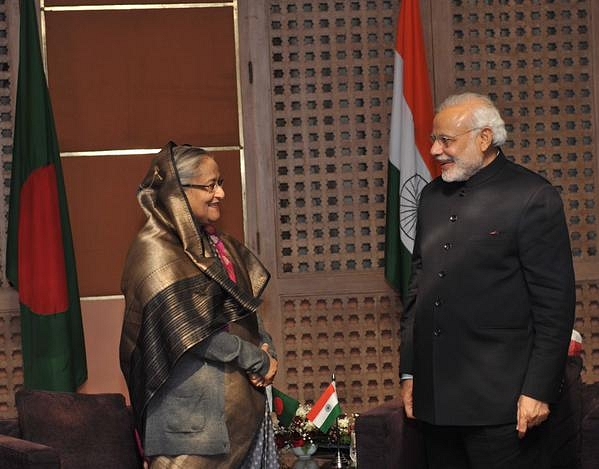World
Talk to thy neighbours

The way forward for greater co-operation in south Asia should be through multilateral economics rather than bilateral politics
South Asia, by and large, has long been an unspoken nemesis in Indian foreign policy. But it isn’t all bad news. Sri Lanka’s new President Maithripala Sirisena visited New Delhi most recently, on his first overseas visit as Head of State, concluding an unprecedented civil nuclear deal while in India. Bangladesh is in domestic turmoil these days, but much before the ongoing political struggle, Prime Minister Hasina was in talks with New Delhi on a landmark boundary agreement to which Dhaka still remains committed.
For all the region’s troubles, New Delhi can’t entirely ignore South Asia. Troubles in the neighbourhood compromise India’s ability to act as a responsible global power. But that aside, South Asia also brings advantages. A united South Asia rallying behind New Delhi would give India greater influence and power on the global stage. And there is the economics too. Given its favorable demographics and large workforce, South Asia holds a lot of untapped economic potential for New Delhi to harness. If South Asia was to complement India therefore, New Delhi’s foreign policy would be transformed.
But India’s South Asia policy thus far has failed; largely because it has engaged with its neighbours bilaterally rather than multilaterally. And bilateral relations in the neighbourhood don’t allow New Delhi use its biggest foreign policy weapon: a growing, robust $2 trillion economy.
There is no better formula to make friends in the world of foreign policy than by offering economic incentives. Every nation in the world today, whether friend or foe, China or America, wants to do business with India’s growing economy. Yet, India’s economic strength has done it more harm than good in managing its relations with neighbours in South Asia. That’s because all of New Delhi’s bilateral dealings in the neighbourhood are overshadowed by disputes. New Delhi spends much time searching for elusive solutions to long-standing political disputes with its neighbours rather than on working out economic deals. But even when it does work on the right track, New Delhi’s economic proposals to its neighbours often collapse under the weight of bilateral disputes.
Consider a more multilateral policy approach instead. Most of India’s disputes with its neighbours are bilateral in nature and are therefore less likely to dominate multilateral talks. On the other hand, economic deals (free-trade agreements and the like) are more workable in multilateral forums since smaller nations often prefer dealing with their larger neighbours while in the company of other neighbours. In fact, multilateral agreements would only strengthen New Delhi’s position as a responsible regional power and help it harness support for its own policies outside the region by rallying together its neighbours.
Critics of such a policy would point out the failure of a multilateral approach at the SAARC and talk of how Pakistan often successfully derails multilateral cooperation in order to spoil New Delhi’s leadership in the region. Even at the latest SAARC summit held late last year, India’s energetic push to create a more cohesive neighbourhood fell flat, as numerous deals and agreements were obstructed singlehandedly by Islamabad. It’s a story that is only all too familiar at the SAARC. Each year, New Delhi brings goodies to the table and each year, Pakistan shoots them all down. With India’s meteoric rise as an economic and geopolitical power since the turn of the millennium, Islamabad has only made things worse, creating fear among members of the SAARC by portraying New Delhi to be a ‘dangerous regional hegemon’.
But Islamabad’s misguided antics cannot be allowed to disrupt the hopes and aspirations of everybody else. Contrary to public perception in India, most of India’s neighbours do desire closer economic cooperation with New Delhi, because of its obvious dividends for their own economy. Business and employment in India’s domestic market are largely favored by politicians everywhere, whether in Sri Lanka or Bangladesh, Nepal or Maldives. Pakistan, of course, is the adverse exception. But if Islamabad wants to stay out of South Asian regional cooperation, that would be a choice of Pakistani foreign policy. The purpose of Indian foreign policy shouldn’t be the blind pursuit of peace with an unwilling Islamabad at the cost of the larger neighbourhood.
Support Swarajya's 50 Ground Reports Project & Sponsor A Story
Every general election Swarajya does a 50 ground reports project.
Aimed only at serious readers and those who appreciate the nuances of political undercurrents, the project provides a sense of India's electoral landscape. As you know, these reports are produced after considerable investment of travel, time and effort on the ground.
This time too we've kicked off the project in style and have covered over 30 constituencies already. If you're someone who appreciates such work and have enjoyed our coverage please consider sponsoring a ground report for just Rs 2999 to Rs 19,999 - it goes a long way in helping us produce more quality reportage.
You can also back this project by becoming a subscriber for as little as Rs 999 - so do click on this links and choose a plan that suits you and back us.
Click below to contribute.
Latest